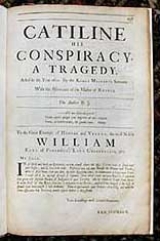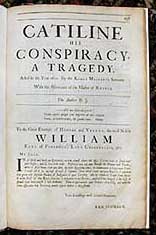
Catiline His Conspiracy
Encyclopedia
Catiline His Conspiracy is a Jacobean tragedy
written by Ben Jonson
. It is one of the two Roman tragedies that Jonson hoped would cement his dramatic achievement and reputation, the other being Sejanus His Fall (1603).
 The play was first published in quarto
The play was first published in quarto
in 1611 by the stationer Walter Burre, prefaced with commendatory verses by Francis Beaumont
, John Fletcher
, and Nathaniel Field
. It was reprinted the 1616 folio of Jonson's works. The folio text states that Catiline was first performed in 1611 by the King's Men
, and lists the cast as: Richard Burbage
, John Heminges
, Alexander Cooke
, Henry Condell
, John Lowin
, John Underwood
, William Ostler
, Nicholas Tooley
, Richard Robinson
, and William Ecclestone
.
, the Roman politician and conspirator of the 1st century B.C.
Jonson was not the first playwright of his era to dramatize the story of Catiline. Stephen Gosson
wrote a version called Catiline's Conspiracies, which was acted by Leicester's Men at The Theatre
in 1579. A Catiline (either Gosson's or another play, author unknown) was acted at the home of William Cecil, 1st Lord Burghley on Jan. 16, 1588. In 1598 or 1599, the Diary of Philip Henslowe
records an advance payment of 5 shillings to Henry Chettle
, for a play titled Catiline's Conspiracy—though Chettle appears never to have completed writing it.
praised the play's subject matter but condemned Jonson's violations of decorum
. The Guardian
states that: "Although booed off stage at its 1611 premiere, it became a great favourite in its day, but has not been staged since the 17th century".
Catiline
is also the subject of Henrik Ibsen
's first play (1850)...
In 2011, the play has been edited and translated for the first time into Italian.
Tragedy
Tragedy is a form of art based on human suffering that offers its audience pleasure. While most cultures have developed forms that provoke this paradoxical response, tragedy refers to a specific tradition of drama that has played a unique and important role historically in the self-definition of...
written by Ben Jonson
Ben Jonson
Benjamin Jonson was an English Renaissance dramatist, poet and actor. A contemporary of William Shakespeare, he is best known for his satirical plays, particularly Volpone, The Alchemist, and Bartholomew Fair, which are considered his best, and his lyric poems...
. It is one of the two Roman tragedies that Jonson hoped would cement his dramatic achievement and reputation, the other being Sejanus His Fall (1603).
Publishing

Book size
The size of a book is generally measured by the height against the width of a leaf, or sometimes the height and width of its cover. A series of terms is commonly used by libraries and publishers for the general sizes of modern books, ranging from "folio" , to "quarto" and "octavo"...
in 1611 by the stationer Walter Burre, prefaced with commendatory verses by Francis Beaumont
Francis Beaumont
Francis Beaumont was a dramatist in the English Renaissance theatre, most famous for his collaborations with John Fletcher....
, John Fletcher
John Fletcher (playwright)
John Fletcher was a Jacobean playwright. Following William Shakespeare as house playwright for the King's Men, he was among the most prolific and influential dramatists of his day; both during his lifetime and in the early Restoration, his fame rivalled Shakespeare's...
, and Nathaniel Field
Nathaniel Field
Nathan Field was an English dramatist and actor; his father was the Puritan preacher John Field and his brother Theophilus Field became the Bishop of Llandaff...
. It was reprinted the 1616 folio of Jonson's works. The folio text states that Catiline was first performed in 1611 by the King's Men
King's Men (playing company)
The King's Men was the company of actors to which William Shakespeare belonged through most of his career. Formerly known as The Lord Chamberlain's Men during the reign of Queen Elizabeth, it became The King's Men in 1603 when King James ascended the throne and became the company's patron.The...
, and lists the cast as: Richard Burbage
Richard Burbage
Richard Burbage was an English actor and theatre owner. He was the younger brother of Cuthbert Burbage. They were both actors in drama....
, John Heminges
John Heminges
John Heminges was an English Renaissance actor. Most noted now as one of the editors of William Shakespeare's 1623 First Folio, Heminges served in his time as an actor and financial manager for the King's Men.-Life:Heminges was born in Droitwich Spa, Worcestershire in 1556...
, Alexander Cooke
Alexander Cooke
Alexander Cooke was an actor in the King's Men, the acting company of William Shakespeare and Richard Burbage.Edmond Malone introduced the hypothesis, still current though far from certain, that Cooke originated Shakespeare's principal female roles...
, Henry Condell
Henry Condell
Henry Condell was an actor in the King's Men, the playing company for which William Shakespeare wrote. With John Heminges, he was instrumental in preparing the First Folio, the collected plays of Shakespeare, published in 1623....
, John Lowin
John Lowin
John Lowin was an English actor born in the St Giles-without-Cripplegate, London, the son of a tanner. Like Robert Armin, he was apprenticed to a goldsmith. While he is not recorded as a free citizen of this company, he did perform as a goldsmith, Leofstane, in a 1611 city pageant written by...
, John Underwood
John Underwood (actor)
John Underwood was an early 17th century actor, a member of the King's Men, the company of William Shakespeare.-Career:Underwood began as a boy player with the Children of the Chapel, and was cast in that company's productions of Ben Jonson's Cynthia's Revels and The Poetaster...
, William Ostler
William Ostler
William Ostler was an actor in English Renaissance theatre, a member of the King's Men, the company of William Shakespeare....
, Nicholas Tooley
Nicholas Tooley
Nicholas Tooley was a Renaissance actor in the King's Men, the acting company of William Shakespeare.Recent research has shown that Tooley was born in late 1582 or early 1583; his birth name was not Tooley but Wilkinson...
, Richard Robinson
Richard Robinson (17th-century actor)
Richard Robinson was an actor in English Renaissance theatre and a member of Shakespeare's company the King's Men.Robinson started out as a boy player with the company; in 1611 he played the Lady in their production of The Second Maiden's Tragedy. He was cast in their production of Ben Jonson's...
, and William Ecclestone
William Ecclestone
William Ecclestone or Egglestone was an actor in English Renaissance theatre, a member of Shakespeare's company the King's Men.Nothing is known with certainty about Ecclestone's early life...
.
Story
As its title indicates, the play recounts the story of Lucius Sergius Catilina, anglicized to CatilineCatiline
Lucius Sergius Catilina , known in English as Catiline, was a Roman politician of the 1st century BC who is best known for the Catiline conspiracy, an attempt to overthrow the Roman Republic, and in particular the power of the aristocratic Senate.-Family background:Catiline was born in 108 BC to...
, the Roman politician and conspirator of the 1st century B.C.
Jonson was not the first playwright of his era to dramatize the story of Catiline. Stephen Gosson
Stephen Gosson
Stephen Gosson was an English satirist.He was baptized at St George's church, Canterbury, on 17 April 1554. He entered Corpus Christi College, Oxford, 1572, and on leaving the university in 1576 he went to London...
wrote a version called Catiline's Conspiracies, which was acted by Leicester's Men at The Theatre
The Theatre
The Theatre was an Elizabethan playhouse located in Shoreditch , just outside the City of London. It was the second permanent theatre ever built in England, after the Red Lion, and the first successful one...
in 1579. A Catiline (either Gosson's or another play, author unknown) was acted at the home of William Cecil, 1st Lord Burghley on Jan. 16, 1588. In 1598 or 1599, the Diary of Philip Henslowe
Philip Henslowe
Philip Henslowe was an Elizabethan theatrical entrepreneur and impresario. Henslowe's modern reputation rests on the survival of his diary, a primary source for information about the theatrical world of Renaissance London...
records an advance payment of 5 shillings to Henry Chettle
Henry Chettle
Henry Chettle was an English dramatist and miscellaneous writer of the Elizabethan era.The son of Robert Chettle, a London dyer, he was apprenticed in 1577 and became a member of the Stationer's Company in 1584, traveling to Cambridge on their behalf in 1588. His career as a printer and author is...
, for a play titled Catiline's Conspiracy—though Chettle appears never to have completed writing it.
Reception
That the play was not a popular success is indicated by Jonson's reproachful preface to the published edition. Thomas RymerThomas Rymer
Thomas Rymer , English historiographer royal, was the younger son of Ralph Rymer, lord of the manor of Brafferton in Yorkshire, described by Clarendon as possessed of a good estate, who was executed for his share in the Presbyterian rising of 1663.-Early life and education:Thomas Rymer was born at...
praised the play's subject matter but condemned Jonson's violations of decorum
Decorum
Decorum was a principle of classical rhetoric, poetry and theatrical theory that was about the fitness or otherwise of a style to a theatrical subject...
. The Guardian
The Guardian
The Guardian, formerly known as The Manchester Guardian , is a British national daily newspaper in the Berliner format...
states that: "Although booed off stage at its 1611 premiere, it became a great favourite in its day, but has not been staged since the 17th century".
Catiline
Catiline (play)
Catiline or Catalina was Henrik Ibsen's first play. It was written during winter 1848-49 and first performed under Ibsen's name on December 3, 1881 at the Nya Teatern , Stockholm, Sweden...
is also the subject of Henrik Ibsen
Henrik Ibsen
Henrik Ibsen was a major 19th-century Norwegian playwright, theatre director, and poet. He is often referred to as "the father of prose drama" and is one of the founders of Modernism in the theatre...
's first play (1850)...
In 2011, the play has been edited and translated for the first time into Italian.

